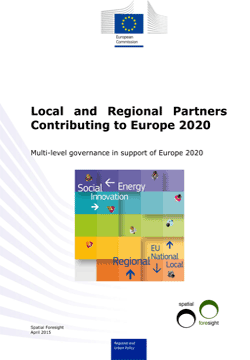Local and Regional Partners Contributing to Europe 2020: Multi-level governance in support of Europe 2020

Studies
Date: 30 apr 2015
Theme: Evaluation, Structural Funds management and Governance
Languages: en
To achieve the Europe 2020 strategy targets, all levels of governance from local to EU levels need to work on implementing this overarching long-term strategy. Multi-level governance describes collective decision-making processes where authority and influence are shared between stakeholders operating at multiple levels of governance. In other words, it describes decision-making processes that engage various independent but interdependent stakeholders. Multi-level governance does not define a model of exclusive decision making powers nor proposes stable hierarchies of authority.What happens on the ground? Most debates on the implementation of the Europe 2020 strategy take place at the EU and national levels, based on EU documents and the National Reform Programmes (NRPs). From there the objectives and targets are assumed to trickle down to the regional and local levels to be translated into action. Stepping away from this command-chain view of Europe 2020 strategy governance and focusing on what happens on the ground shows diverse objectives being pursued, diverse arrangements and diverse processes at local and regional levels being realised.
Study on multi-level governance in support of Europe 2020. To stimulate discussion and potential transfer of learning DG REGIO launched a study on multi-level governance in support of Europe 2020. This study analyses eight case studies to better understand existing governance arrangements. Four case studies concern energy efficiency and four others focus on social inclusion. Based on these studies, seminars and workshops were organised to discuss the findings and possible transfer of governance tools and ideas to other cities and regions in Europe. The scope and timeframe of the study were too limited to allow definitive overarching conclusions to be drawn. Nevertheless the results provide valuable input to the discussion on multilevel governance processes in support of the Europe 2020 strategy and the roles of local and regional authorities in particular. The national and EU levels were also identified as relevant in several case studies.
Annexes
- Terms of reference en
- Case Study - Prignitz-Oberhavel: New approach to a regional energy strategy en
- Case Study - Vrhnika: New approach to Local Energy Concepts en
- Case Study - Lombardy: A new approach to a regional territorial plan en
- Case Study - Alsace: ENERGIVIE Programme and Cluster fostering and supporting the emergence of innovative energy products and services en
- Case Study - Stockholm: The Urban Game as a neutral platform for policy coordination en
- Case Study - Pomorskie: A new approach to incubation and implementation of urban revitalisation en
- Case Study - Timișoara: A new approach to integrating non-EU migrants en
- Case Study - Liverpool city-region: Encouraging entrepreneurship to support social inclusion en
- Inception Report en
- Seminar summary en
- Seminar en
